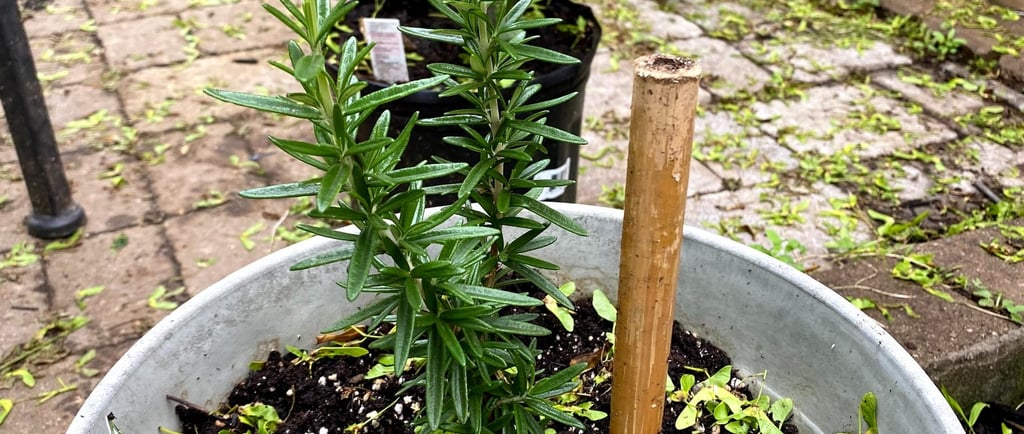Lesson 2 - Stake It
Life lessons from the garden. Lesson #2: Stake it. Measure against a reference.
LESSONS FROM THE GARDEN
Jacob Citron
10/1/20254 min read


Stake It: Measure Against a Reference
“It’s definitely taller today.”
That was a common remark to my roommate during my first summer of gardening. Each morning, I’d head out for what he jokingly called “inspection.” I’d march up and down the row of juvenile plants, examining each one meticulously. But what was I looking for, exactly?
Like many new gardeners, I started with some familiar herbs, Basil, Thyme, & Rosemary. I had a lot of trouble with the Rosemary. For the first month, I thought it was growing. But I wasn’t entirely sure. Abstract “Growth” was my measure of success. I figured it was a good goal because that’s what gardeners do, right? If the plants were thriving, then I, as a plant dad, must be doing something right.
The problem was that I was eyeballing it. I didn't have a point of reference - I only sorta- kinda, thought that the plant was growing a bit each day. But if it was growing, it certainly wasn’t visible to me.
It reminded me of the allegory of the frog in boiling water. Without a thermometer, how would it know the temperature is rising? It wouldn’t. It needed a reference point. Without a reference point, I couldn’t tell if my plants were growing.
So I made the courageous decision to put a stick in the dirt. The simplest tool I could find to act as a stake in the soil. The stick came right up to the height of the plant, and that became my baseline. From that moment on, I could see the progress. I had a metric. So as the days turned over, I could see that - yes, the plants were growing. A revolution in thinking with something so basic.
When I zoomed out a bit, I realized that this idea applied far beyond gardening. Measuring against a reference. Putting a stake in the ground and knowing where you're at.
At the time, I had a close friend in a long-term relationship that just wasn’t working. He had been miserable for years, and kept saying things were going to get better. When I asked what that meant though, he couldn’t point to anything concrete. There were no shared goals, no agreements, no metrics. So when he wanted to voice his concerns to his partner, he didn't have the evidence to bring to bear. We spoke and I gave him the staking analogy - and it was a huge unlock. Over the next month, he set some baselines and was able to voice his concerns and think through his situation. He luckily was able to see that, after months of holding on, no growth or progress were being made. He's a way happier man now.
Without metrics, you’re flying blind. You’ll let emotions and optimism cloud your judgment. This is incredibly salient when it comes to interpersonal relationships. Most people I know are wonderful people. They are forgiving and hopeful. They’ll spin a narrative to see the best in others or in a situation. But that doesn’t help if you’re in a trance and unable to see clearly.
Another close friend struggles with their mental health. When confronting his affliction, he didn’t know if things were improving or deteriorating. So he started rating his days out of 10. Over time, he graphed the results and saw how therapy and medication were affecting him. Mental health is notoriously hard to measure, perceived baselines shift constantly. But with data, he could see patterns and progress. Now, it serves as a reminder that his bad days (5s and 6s) are way better than his bad days before seeking help (2s & 3s). He also remembers that his panic attacks are gone.
The same logic can apply to career. If you’re unsure about your job, I'd recommend starting with data. Track how you feel about work each day. Rate it. Write a few notes. Over time, you’ll begin to notice trends. Are things improving? Are you stuck? Are your emails being answered? Are you getting the recognition you want? It won't fix the bad situation, but it might allow you to realize where you stand, and act accordingly.
Are you making sales? Are you meeting with clients? Have you bothered reaching out to prospects? it's easy to be lazy and lose track without a grounding force.
Metrics bring clarity. Get creative with what you're measuring but know what the number means, and what it's trying to represent. It's like OKRs if you're familiar with Objectives and Key Results. The Objective is what you're after (the higher goal). The key results are the numbers that tell you you are on the right track. For the tomatoes, the objective was "growth" the key result was "It's 1 inch taller than it was at the start of the week".
In relationships, it could be:
How many good days vs. bad days? (Are you actually happy?)
How often are you having sex? (Is the spark still there?)
Do you have monthly check-ins? (Are your channels for communication open?)
Are you going on dates regularly? (Are you treating the relationship with the honour it deserves?)
Are you eating meals together? (Are you doing those little things that indicate a healthy partnership?)
Are you saying “I love you” regularly? (Are you showing each other how much you care?)
These aren’t magic fixes, but they’re excellent lagging indicators.
In your career, metrics might include:
Hours worked - (Are you putting in overtime without any benefit?)
Salary & compensation progression (Are you making what you want?)
Performance reviews (Is your work being appreciated?)
Manager meetings (Are you getting the attention you deserve?)
Good vs. bad days (Are you actually happy at your job?)
You can set your standards and see if they're being met. Why not
In life, you can track:
Health & Fitness with step counts or workouts per week (Are you as active as you want)
Times you're going out a week or a month (Are you getting your social reps in, or do you need to tone it down and relax a bit?)
Hours spent doing useful hobbies and chores vs watching TV or gaming (Are you using your time usefully, or are you allowing yourself to recharge?)
Daily mental Health well being on a scale from 1-10 (
Like so many things in life and gardening, these key components can be really hard to eyeball. Wellness is elusive, and if you want to be successful in relationships, work, or personal growth, you need to set goals and measure them. Put the stake down. See where you’re at. Make that your new baseline.
Then, every day, you’ll know if you’re growing.
Found this article useful?
Subscribe below:
accordingtojacob
Thoughts from a simple man in a complex time
Contact
Subscribe
info@accordingtojacob.com
© 2025. All rights reserved.
